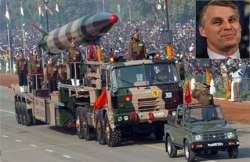Indian Army 'Lumbering And Slow': US Envoy Roemer Says In His Cable
Washington, Dec 2 : If India were to launch "Cold Start" — a quick, limited military strike to punish Pakistan — its army will not to be able to carry it off as quickly as

Washington, Dec 2 : If India were to launch "Cold Start" — a quick, limited military strike to punish Pakistan — its army will not to be able to carry it off as quickly as envisaged by the doctrine, says a leaked cable from US embassy in New Delhi.
"Indian forces could have significant problems consolidating initial gains due to logistical difficulties and slow reinforcement," said the cable sent on February 16 this year under the seal and sign of US ambassador to India Timothy Roemer, reports Hindutan Times.
This cable is among the scores of US state department papers released by WikiLeaks to selective news organisations around the world, who are putting them out in a staggered manner.
The existence of Cold Start as a military doctrine has never been confirmed by India, though there was widespread domestic criticism of the snail-pace amassing of troops at the border in response to the 2001 Parliament attack.
But Pakistan is convinced of the existence of Cold Start and makes it the cornerstone of its military strategy against India, clinging to it as the reason for not redeploying troops from its eastern front to the west for the war against terrorism.
Though admitting to lack of official confirmation of the doctrine, the cable says Cold Start was born in 2004 because of the widespread criticism of the "lengthy process of mobilisation, lack of strategic and operational flexibility" in 2001.
"In order to avoid the Indian Army's slow and lumbering military mobilization process and preserve the element of surprise in attack, Cold Start attacks could begin within 72 hours after the attack order has been given…" goes the cable's description of the operation.
The key elements of the doctrine are: speed to pre-empt international effort to prevent it, limited penetration to avoid a nuclear response and overwhelming use of firepower to inflict massive, salutary punishment.
But the cable says that in the "collective judgement" of the mission (the US embassy in New Delhi), if and when Cold Start is used, the results will be mixed. There will be some initial gains because of quick response. But then the problems will kick in.
"Indian forces could have significant problems consolidating initial gains due to logistical difficulties and slow reinforcement," the cable says, adding, "India would have to overcome, challenges that range from road and rail transportation to ammunition supply."
"Indian forces could have significant problems consolidating initial gains due to logistical difficulties and slow reinforcement," said the cable sent on February 16 this year under the seal and sign of US ambassador to India Timothy Roemer, reports Hindutan Times.
This cable is among the scores of US state department papers released by WikiLeaks to selective news organisations around the world, who are putting them out in a staggered manner.
The existence of Cold Start as a military doctrine has never been confirmed by India, though there was widespread domestic criticism of the snail-pace amassing of troops at the border in response to the 2001 Parliament attack.
But Pakistan is convinced of the existence of Cold Start and makes it the cornerstone of its military strategy against India, clinging to it as the reason for not redeploying troops from its eastern front to the west for the war against terrorism.
Though admitting to lack of official confirmation of the doctrine, the cable says Cold Start was born in 2004 because of the widespread criticism of the "lengthy process of mobilisation, lack of strategic and operational flexibility" in 2001.
"In order to avoid the Indian Army's slow and lumbering military mobilization process and preserve the element of surprise in attack, Cold Start attacks could begin within 72 hours after the attack order has been given…" goes the cable's description of the operation.
The key elements of the doctrine are: speed to pre-empt international effort to prevent it, limited penetration to avoid a nuclear response and overwhelming use of firepower to inflict massive, salutary punishment.
But the cable says that in the "collective judgement" of the mission (the US embassy in New Delhi), if and when Cold Start is used, the results will be mixed. There will be some initial gains because of quick response. But then the problems will kick in.
"Indian forces could have significant problems consolidating initial gains due to logistical difficulties and slow reinforcement," the cable says, adding, "India would have to overcome, challenges that range from road and rail transportation to ammunition supply."